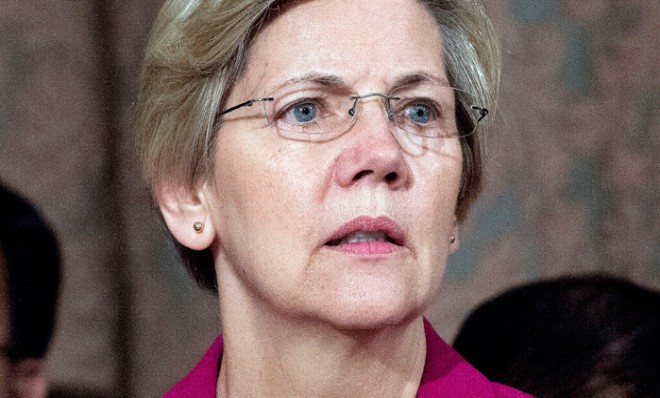Does America need a 21st century Glass-Steagall Act?
Sen. Elizabeth Warren thinks so, and is gearing up for some "financial rabble-rousing"

A free daily email with the biggest news stories of the day – and the best features from TheWeek.com
You are now subscribed
Your newsletter sign-up was successful
Sen. Elizabeth Warren (D-Mass.) is gearing up for some "financial rabble-rousing," said Kevin Roose at New York. Last week, she introduced a bill that would force big banks to split apart their commercial and investment banking operations. Dubbed the "21st Century Glass-Steagall Act" because it reinstates key provisions of the repealed 1933 Glass-Steagall Act, the bill aims to "make the entire banking system safer and less crisis-prone" by shrinking big banks and making it harder for those with federally insured deposits to engage in "risky stuff." Even with the co-sponsorship of Sen. John McCain (R-Ariz.), the bill has "virtually no chance of passing," but that's not Warren's true aim; she's really playing a "long game" of convincing legislators that "on issues involving Wall Street, the center isn't where you think it is." A shift in the political consensus "will do much more damage to Wall Street in the long term than simply breaking up a few banks."
But it's a wrongheaded idea from the start, said John Tamny at Forbes. I hate bailouts as much as the next guy, but if we break up big banks, we'll just get smaller ones facing unbearable "profit pressures for being made artificially small." Talent and investors will be driven elsewhere, and if those smaller banks are forced to "merge again in order to compete," any failures will rest squarely on the government's shoulders. "Hello bailouts again." The real solution isn't stricter regulation — it's to stop regulating banks altogether. Maybe then we'll "get what we've always wanted in terms of bank size, risk profile, innovation, and everything else that free markets always deliver without fail."
If we listen to the free market, said John Authers at the Financial Times, it's already rendered its verdict on big banks. Just look at how stock values for financial companies have plummeted since the original Glass-Steagall Act was repealed in 1999. "Financial supermarkets" such as Citigroup and Bank of America swelled to unmanageable sizes after repeal, and "contributed to awful errors in risk management." Repealing the law also caused our "too big to fail" problem. Before the original Glass-Steagall Act was repealed, the five biggest banks accounted for just 13 percent of assets; by 2009, that number was at 38 percent. Laws like Glass-Steagall "helped the U.S. avoid the over-concentration and over-banking" that made European banks too large for their governments to rescue. Without Glass-Steagall, "the one-stop shops knew they were too big to fail, encouraging risk-taking." Too bad the chances are so slim that this bill will pass.
The Week
Escape your echo chamber. Get the facts behind the news, plus analysis from multiple perspectives.

Sign up for The Week's Free Newsletters
From our morning news briefing to a weekly Good News Newsletter, get the best of The Week delivered directly to your inbox.
From our morning news briefing to a weekly Good News Newsletter, get the best of The Week delivered directly to your inbox.
This legislation would achieve nothing, said Matthew C. Klein at Bloomberg. It's based on the myth that combining commercial and investment banking caused the financial crisis, and that future crises can be warded off by "enforcing a hard separation" between "boring" banking and "dangerous" banking. But wait a minute. "Countrywide, Washington Mutual, Wachovia, and IndyMac were all 'boring' lenders that managed to fail spectacularly." Boring banks can take foolish risks, too. If Warren's "quixotic" campaign is designed only "to expand the debate about banking regulation," fine. But it would be more effective to insist that banks have enough equity to cover all their bets.
A free daily email with the biggest news stories of the day – and the best features from TheWeek.com
Sergio Hernandez is business editor of The Week's print edition. He has previously worked for The Daily, ProPublica, the Village Voice, and Gawker.
-
 Switzerland could vote to cap its population
Switzerland could vote to cap its populationUnder the Radar Swiss People’s Party proposes referendum on radical anti-immigration measure to limit residents to 10 million
-
 Political cartoons for February 15
Political cartoons for February 15Cartoons Sunday's political cartoons include political ventriloquism, Europe in the middle, and more
-
 The broken water companies failing England and Wales
The broken water companies failing England and WalesExplainer With rising bills, deteriorating river health and a lack of investment, regulators face an uphill battle to stabilise the industry